Coordinación
Una coordinación sólida puede evitar vacíos y duplicaciones en las respuestas humanitarias, así como garantizar que los PTM complementen otros tipos de asistencia. Sin embargo, el informe del «Estado Global de los Programas de Transferencias Monetarias» de la CALP Network muestra que la coordinación de la asistencia en efectivo es vista como débil y ad hoc, y que esto está teniendo graves repercusiones operativas.
Los donantes, las ONG y los líderes de los grupos de trabajo de transferencias monetarias (GTM) han pedido claridad sobre tres temas principales relacionados con la coordinación de la asistencia en efectivo:
- Quién debe ser responsable de asegurar una coordinación eficaz de la asistencia en efectivo;
- Cuál es la función y el mandato de los grupos de trabajo de transferencias monetarias, incluso en relación con las transferencias monetarias multipropósito;
- Cómo se debe dotar de recursos a la coordinación de asistencia en efectivo.
Tenemos que basarnos urgentemente en lo que funciona y proporcionar claridad a nivel mundial sobre las preguntas arriba mencionadas, adaptándonos a los diferentes contextos. Hace mucho tiempo que se deberían haber tomado decisiones claras basadas en necesidades operativas y no en la política de las agencias.
Prioridades actuales
El objetivo de la CALP Network es contribuir a seguir progresando en este tema en tres niveles: apoyar a los grupos de trabajo de transferencias monetarias a nivel regional; contribuir a soluciones prácticas para la coordinación de la asistencia en efectivo a nivel mundial; y convocar una discusión basada en la evidencia sobre temas clave, destacando puntos de decisión críticos y oportunidades de progreso.
Contenido destacado

Cash Coordination Tip Sheet
Guidelines and Tools
This tip sheet sets out established best practice, key guidance and resources for all aspects of cash coordination, intended as a clear, accessible and action-oriented guide for those engaged in coordination of cash and voucher assistance (CVA) at the field level.

Introducing the Cash Coordination Tip Sheet
Webinar
The CALP Network has developed a tipsheet setting out established best practice and key guidance and resources for all aspects of cash coordination, intended as a clear, accessible and action-oriented guide for those engaged in coordination of cash and voucher assistance at the field level.

Cash Coordination: A proposal from members in MENA
Blog Post
Earlier this year the CALP Network undertook regional consultations to explore options for cash coordination. This blog lays out recommendations from participants from the Middle East and North Africa who sketched out what cash coordination, and coordination more broadly, could look like in future to support a more effective, efficient and accountable response.
Últimos recursos
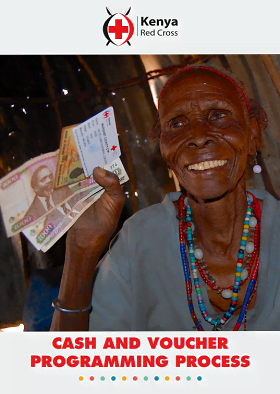
Kenya Red Cross Society’s – Cash and Voucher Programming Process
Guidelines and Tools
The document has been developed to highlight the general process that Kenya Red Cross Society uses when implementing Cash and Voucher programs/operations. Its a summarized version of Kenya Red Cross Society’s Standard Operating Procedure.

Kenya Red Cross Society Using New Technology to Reach Communities in Hardship Areas
Report
Kenya Red Cross Society responded to the severe drought through cash transfers in Marsabit county. Unlike an earlier drought, where KRCS used manual system to pay beneficiaries in the same geographical area, this year the organisation used a payment technology provided by a company called Compulynx....

Lessons from Northern Uganda in addressing gender based violence
Report
This case study summarises Action Against Hunger work in North Uganda. ACF aims to empower women in Northern Uganda using a two pronged strategy; a) cash transfers, skills training and VSLAs for income generating activities, and b) interventions to prevent violence against women at the household...

Learning Event Report: Multipurpose cash and protection for south sudanese refugees in Bidibi refugee settlement Uganda
Report
A consortium of partners comprising DanChurchAid (DCA), Transcultural Psychosocial Organization (TPO) and Mercy Corps (MC) have been implementing an 8-month Cash-based Interventions and Protection (MHPSS) response for South Sudanese refugees in Bidibidi settlement. The response was aimed at addressing...

Cash for Education: A global review of UNHCR programmes in refugee settings
Report
This review provides an overview of the use of cash assistance in 45 cash-related education programmes in 21 UNHCR operations. It highlights the key opportunities and challenges with the use of cash for education and provides key direction for future programming and related protection considerations....

Delivery Mechanism Mapping for Cash Based Interventions in Cox’s Bazaar Bangladesh
Report
The ‘Delivery Mechanism Mapping for Cash Based Interventions (CBI) in Cox’s Bazaar, Bangladesh’ was conducted in December 2017 by a ‘Cash Champion’ deployed from Catholic Relief Services (CRS) with the support of the Global Shelter Cluster and ECHO, and involved consultations with numerous...

Counting Cash: Tracking Humanitarian Expenditure on Cash-Based Programming
Report
This working paper aims to begin filling the data gap by providing a baseline estimate on the volume and nature of cash-based programming in 2015. Most of the largest implementing agencies of cash and voucher programming have provided us with data on their organisational expenditure relating to...

A Review of Inter-Agency Collaboration for CTP Delivery
Report
Recent global initiatives have reaffirmed the potential for Cash-Transfer Programmes (CTP) to effectively and efficiently meet a wide range of disaster-affected populations’ needs while preserving dignity and choice. Although much work has been done in advocating for the benefits of CTP and enhancing...
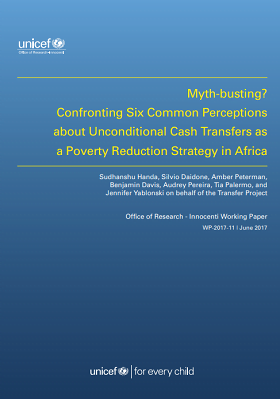
Myth-busting? Confronting Six Common Perceptions about Unconditional Cash Transfers as a Poverty Reduction Strategy in Africa
Report
This paper summarizes evidence on six perceptions associated with cash transfer programming, using eight rigorous evaluations conducted on large-scale government unconditional cash transfers in sub-Saharan Africa, under the Transfer Project. Specifically, it investigates if transfers: 1)...

A buffer against the drought
Report
The Government of Kenya in partnership with DFID undertake a long term social protection program(Hunger Safety Net Program) in Northern Kenya reaching out to poor households with bi monthly cash transfers. So much investment has been put in this program including pre-registration and carding of...
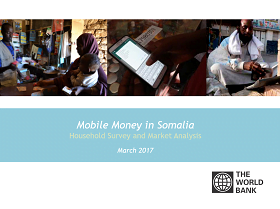
Mobile Money in Somalia – Household Survey and Market Analysis
Report
Key findings from an assessment of mobile money in Somalia. Provides information about mobile money penetration; practicalities; usage; perceptions and the use of shillings versus dollars.

Shock-Responsive Social Protection Systems Research Case Study: Pakistan
Report
This case study presents an overview of the social protection disaster risk management and humanitarian systems in Pakistan, and discusses both Pakistan’s flagship social protection programme, the Benazir Income Support Programme (BISP), as well as emergency cash transfers provided as disaster...

Baseline Survey for Project Output and Livelihoods Support Assessment
Report
This report highlights the baseline findings of the UNHCR funded project “Increased self-reliance through cash interventions and livelihoods support to conflict-affected South Sudanese refugees in Bidibidi refugee settlement and host communities in Yumbe District in Uganda” implemented by...

Multisectoral Basic Needs and Market Assessment Moyo Uganda
Report
A multisectoral basic needs and market assessment done in Palorinya settlement and the host communities within Moyo district. Focuses are on basic needs and cash feasibility, the education system gaps, the firewood issues and access to loans and credit.
Data were gathered in December 2017, with...
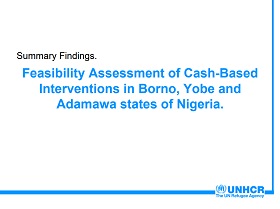
Feasibility Assessment of Cash-Based Interventions in Borno, Yobe and Adamawa states of Nigeria
Report
Outputs
• Analyse the feasibility and available response options for
potential CBIs covering basic needs, livelihoods and
support to vulnerable persons, and moving forward
toward MPGs
• Recommendations and action points……
• Support the Design of a CBI intervention and develop SOPs (2017)
•...

Case Study: Education for South Sudanese Refugees in Ethiopia
Report
An education programme for South Sudanese refugees in Ethiopia illustrates the use of two complementary sets of standards: the Inter-Agency Network for Education in Emergencies (INEE)’s Minimum Standards for Education and Sphere Humanitarian Charter and Minimum Standards.

From Grand Bargain to Beneficiary: An Analysis of Funding Flows Through the Humanitarian System
Report
The study undertook a financial analysis of a range of projects that received ECHO funding in order to answer the following questions listed in full in the terms of reference (Annex 1): How much donor money (net) gets to the beneficiary? What are the total costs of each stage in the chain? What is...

Enacting urban cash for work programmes in Lebanon in response to the Syrian refugee crisis
Guidelines and Tools
Humanitarian crises in cities require responses that reflect the urban context,address urban challenges, and provide urbanised solutions. This paper focuses on providing guidance on good practice in cash for work (CfW) programmes. Focusing on Lebanon and the Syrian refugee crisis, the paper provides nine...
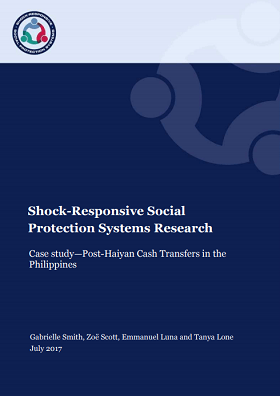
Shock-Responsive Social Protection Systems Research Case study—Post-Haiyan Cash Transfers in the Philippines
Report
This case study report focuses specifically on the experiences of using emergency cash transfers following Typhoon Haiyan and considers the wider social protection system, developments since Haiyan and future possibilities for shock-responsive social protection. A summary briefing note is published...
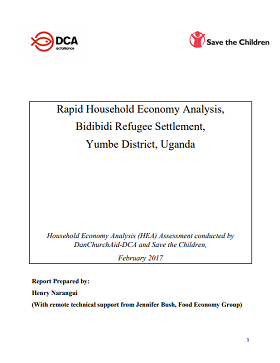
Rapid Household Economy Analysis,Bidibidi Refugee Settlement,Yumbe District, Uganda
Report
Yumbe District (Bidibidi settlement) hosts about 272,2061 refugees from South Sudan. An influx of refugees to Bidibidi settlement, Yumbe District, took place starting from August 2016 due to the increased conflict, scarcity of food, and subsequent financial instability caused by hyperinflation in South...